Write An Entry-Level Cover Letter (Examples, Tips & Template)

So, you’re applying to an entry-level job and wondering where a cover letter fits in the application package.
Is an entry-level cover letter a requirement? If so, what should you write in your entry-level cover letter to really improve your employment chances?
Should it be the same as a normal cover letter, or should it include some specific information that can serve an entry-level job? Yeah, there are quite a few questions on the topic—and for good reason. After all, who doesn’t want their application to be as perfect as possible?
In this article, we’re going to teach you everything you need to know about entry-level cover letters.
- What’s an Entry-level Cover Letter and Why It Matters
- Entry-level Cover Letter Format
- Tips & Examples on Writing an Entry-Level Cover Letter

Entry-level Cover Letter Template
...and more!
Ready? Let’s dive in!
What Is An Entry-Level Cover Letter?
An entry-level cover letter is a cover letter that you write when you’re applying for an entry-level job.
As such, you will need to write an entry-level cover letter on these occasions:
- As a college senior on a job hunt.
- As a recent college graduate looking to land his first job.
- As a professional who has changed industries/career paths.
In any of these cases, an entry-level cover letter is an essential part of the application.
One could even argue that entry-level cover letters are even more beneficial to your resume than your average cover letter.
Here’s why:
As a college senior/graduate or someone changing careers, chances are, your resume might not be that rich in terms of practical work experience.
So, in addition to your resume, your cover letter is your second-best chance to explain why you’re the perfect fit for the job!
What Should an Entry-Level Cover Letter Include
Before we get into the specifics of writing an entry-level cover letter, let’s go over the basics.
Namely, the format .
If you don’t know how to properly “set up” your letter, it will end up being disorganized and confusing .
Entry-Level Cover Letter Format
So, what should your entry-level cover letter contain? Here are all the details.
- Header with contact information. In addition to your name, your contact information should contain your email (a professional email, that is), your phone number, and (optionally) LinkedIn profile. Underneath your contact info comes the date and then the receiver’s information: manager’s name and title, company name, and the company’s street address.
- Addressing the hiring manager. How you address the cover letter is important. Preferably, you want to include the hiring manager’s name/professional title or the name of the department head doing the hiring.
- Opening statement. Your opening paragraph should be professional, but at the same time personal and attention-grabbing. The best way to achieve that is by tailoring your introduction to the job application.
- The body. The body of your entry-level cover letter should consist of 2-3 paragraphs highlighting your skills, accomplishments, and education.
- Closing paragraph. To end your cover letter, you need a professional closing paragraph. You can mention that you will be following up the cover letter, wrap up anything you couldn’t in the previous paragraphs, or just simply thank the recruiter for their time.
- Formal salutation. Formal closings include salutations such as “best regards,” “kind regards,” “sincerely,” and “thank you.”
How to Write an Entry-Level Cover Letter With No Experience (Tips & Examples)
Ready to get into the knits and grits of writing an entry-level cover letter?
Great! Let’s get to it.
#1. Write a Strong (But Professional) Opening
The first thing you want to do is write an attention-grabbing opening paragraph.
Recruiters receive hundreds of applications daily, so you can probably imagine how limited their time is. This leaves you with one goal—to make your cover letter worth reading, right from the get-go.
One thing is for sure, you’ll never achieve this by writing a generic, one-fits-all kind of introduction, like the one below:
My name is Samantha and I’d like to apply for the Sales Representative entry-level position at your company. I am a recent Marketing graduate, so I believe I would be a great fit for the role.
See, you could use this kind of introduction to apply for any entry-level position in sales. And though it’s not bad, per se, it’s not memorable either.
Instead, you want your opening paragraph to be custom-made for the entry-level job you’re applying for. Bonus points if you can mention an achievement or two in the opening paragraph to show the recruiter how you stand out from the rest of the candidates.
Here’s what a well-written entry-level cover letter would look like:
My name is Samantha and I’d like to become part of XYZ Inc. by applying my newly acquired marketing knowledge to your Sales Representative position. I am confident that my excellent university results and the practical knowledge gained during my academic internship at Company X, where I was trained in sales, make me the right candidate for the job.
#2. Include Relevant Employee Skills
After you prepare the ground with an attention-grabbing introduction, you should use the body of your cover letter to show exactly how your skills, achievements , and education make you the right fit for the job.
In light of your limited work experience, your skills are your second-best chance to prove your worth and showcase your strengths.
Start by listing skills that are relevant to the job by doing the following:
- Scan the job description to find what the required skills are for the position.
- Explain how your skills can benefit the company.
- Optionally, you can mention that you are eager to learn required skills that you may not have to get better at the job.
For example, an entry-level journalism position may require that you:
- Know how to apply the AP Stylebook rules
- Are up to date with media law and ethics
- Are an effective communicator
- Can meet deadlines.
Here’s how you could highlight those skills:
As a recent Journalism and Mass Communication graduate from X University, I am up to date with the 55th Edition of the Associated Press Stylebook and all media law and ethical reporting standards. Being Editor-in-Chief of the university’s newspaper taught me how to be an effective communicator while being in charge of publishing the newspaper each week improved my attention to detail and ability to meet deadlines.
#3. Do Some Research
Research is one of your best friends when it comes to cover letters, as it can give you valuable information on what the recruiters are looking for in a candidate.
After thoroughly researching the company’s history, products/services, goals, and even challenges, you can mention exactly how:
- You fit in the position
- You stand out from your competition
- You can be of use to the company
Say, for example, that you’ve previously worked as a proofreader and you’re now going into magazine editing. After some research, you find out the magazine you’re applying to puts great attention to producing quality content.
Here’s how you can work that to your advantage:
I have read the content your magazine produces and I think it’s extremely well-researched, reader-friendly and grammatically correct.
During my 5-year experience as a proofreader, I have mastered editing and writing and I am confident that this experience can further improve your magazine quality.
#4. Quantify Your Achievements (When Possible)
The best practice, whenever achievements are involved, is to quantify them and back them up with concrete examples.
Imagine you’re a recruiter and you’re on the fence about two candidates for an entry-level customer service position. They have almost-identical resumes in terms of education and they claim to have customer support experience from past internships.
So, you jump to their cover letter. This is how each candidate has described their achievements:
Candidate 1
As a Client Services intern, I was required to contact and ask clients for feedback daily, I supported the management team in improving customer services based on clients’ comments and I provided suggestions to teams from other departments to improve overall client satisfaction.
This is not horrible. However, compared with the second candidate’s much more detailed description, it lacks substance. Take a look for yourself.
Candidate 2 As a Customer Services intern at Company X, I helped raise customer satisfaction by speaking to and collecting our clients’ feedback and working with teams from different departments to address their dissatisfaction and implement relevant suggestions. After one year, we ran a survey that showed customer experience had improved by 50%. This result was backed by a 30% increase in profit within that same year.
Sure, the first candidate “improved customer services,” but this opens up a lot of questions:
- How well did they improve the customer services?
- Over what timeframe?
- What kind of impact did this have on the company’s bottom line?
The 2nd candidate, though, mentions all this information, and as such, their cover letter is a lot more impactful.
#5. Highlight Your Education
Your education can very well replace what you lack in work experience when it comes to entry-level jobs. It can convincingly back up your skills and achievements, as well as help you demonstrate some of your strengths.
Now, when we tell you to highlight your education, we don’t mean mentioning the title of your diploma and calling it a day.
Instead, what you need to do to reinforce your skills and strengths is to mention relevant group projects and classwork, extracurricular activities and school clubs, published work, or independent research.
Highlighting your education can be just as effective if you’re changing career paths.
Did you take classes on your newly-found passion when you were in college? Or maybe you got to practice it as part of a club. No matter the case, make sure to highlight it, as this is exactly the part of your education that will make a difference in your cover letter.
Now, let’s say you’re a college senior thinking ahead and looking for a graphic design job for when you graduate. To improve your chances of getting that entry-level job, here’s how you can highlight your education:
My passion for visually communicating a message began alongside my work at InFocus Magazine, our university’s photography and graphic design magazine, where I am Head of Design. I mainly work with Adobe InDesign and Illustrator, but I am now also learning to use Canva and Crello in my Design & Illustration class.
#6. Don’t Forget a Call to Action
Finally, it’s time to wrap up your entry-level cover letter with a conclusion.
For your entry-level cover letter’s final paragraph, you want to do the following:
- Mention anything you couldn't during the previous paragraphs. If you think you left something important out (something that could help you get hired), this is your chance to say it.
- Thank the recruiter. You can use the closing paragraph to thank them for their time. This is a chance to be formal, but make sure you don’t sound like you’re trying to get to the recruiters’ good side.
- Include a call to action. As a call to action, you can mention to the recruiter that you will be following up (if they haven’t specified the interviewing procedure) to inquire about the application or ask them to take some action.
And here’s what this would look like on a cover letter:
To conclude, let me first thank you for considering my application. I believe I can help your company improve its customer satisfaction by putting to use all the experience I’ve gained from my past jobs in customer service. I’d love to discuss in length how I can help you improve one-on-one customer service at your stores.
#7. Conclude with a Professional Closing
Once you’ve written your closing paragraph, all you have to do is sign off your cover letter.
Your “goodbye” should be formal and include only your name and signature.
Any of the following is an acceptable way to sign off your cover letter:
- Best Regards,
- Kind Regards,
- Sincerely,
- Thank you,
Want to know other ways to conclude your cover letter memorably? Head over to our guide on how to end a cover letter for additional info!
#8. Proofread Your Letter
And you’re finally done!
Make sure to proofread your cover letter before attaching it to your job application. Any effort you might have put into it will lose value if your cover letter has mistakes.
You can either give it to a friend to proofread it or use editing software like Grammarly and Hemingway .
Want to Make Things Easy? Use a Cover Letter Builder
The way you design your cover letter matters!
Sure, you can go for a generic text in a Word Document, but having a well-designed cover letter that matches your resume in style will help you stand out much more in a sea of applicants.
Well, Novoresume makes that easy for you! Just pick any of our matching cover letters and resume templates and leave a lasting impression!
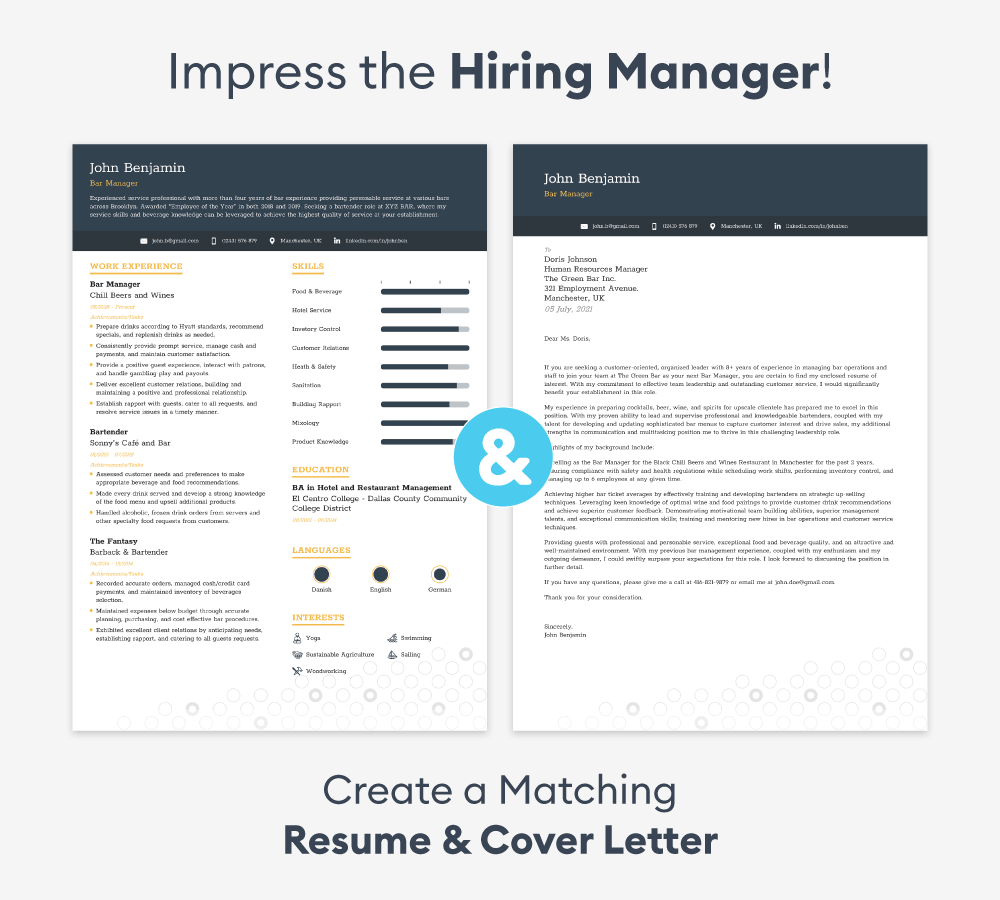
[First Name and Last Name]
[Email Address]
[Phone Number]
[LinkedIn/Website]
[Date of Writing]
[Manager’s Name]
[Manager’s Job Title]
[Company Name]
[Company’s Street Address]
[City, State, ZIP Code]
[Addressing the hiring manager]
[Write your attention-grabbing opening paragraph]
[Write 2-3 paragraphs where you include skills that are relevant to the position you are applying for, where you quantify your achievements (when possible), and where you highlight your education.]
[Conclude by saying thank you and by making a call to action.]
[Sign off your letter professionally]
Key Takeaways
And that’s a wrap! We hope that you feel more confident about your entry-level cover letter knowledge and writing after reading this article.
Now let’s go over the main points we covered:
- An entry-level cover letter is a cover letter that you write for an entry-level job. You may need to use it as a college senior or recent college graduate or as a professional changing career path.
- Your entry-level cover letter should follow the following format: header, addressing the recruiter/company, opening paragraph, body, closing paragraph, formal salutation.
- To write a good entry-level cover letter you should write an attention-grabbing opening, include some relevant skills, highlight your education, and make a call to action.
- Use a cover letter builder to make sure your cover letter meets recruiters’ standards and to save your time.
Related Readings
- How to Write a Cover Letter
- How to Start a Cover Letter
- Cover Letter for Internship

To provide a safer experience, the best content and great communication, we use cookies. Learn how we use them for non-authenticated users.
- English (UK)

- Cover Letter Examples
Entry-Level Cover Letter Examples, Tips & Writing Guide
Learn how to write a cover letter with no experience, a first job cover letter, or an entry-level cover letter that makes the best impression. It's easier than you think!

Seeing a targeted cover letter is what recruiters crave. More than 50% of them want applicants to attach one to the resume. So get your entry-level cover letter right the first time around and give your resume an extra boost.
Good news. You’re just a few steps away from writing a perfect piece.
In this cover letter guide, you’ll see:
- A winning entry-level cover letter template that lands interviews.
- How to write a cover letter for a job with no experience in that field.
- Dozens of top resume cover letter examples of what to say in the intro, body, and cover letter closing.
- Expert tips and advice on writing a good cover letter for entry-level jobs.
Save hours of work and get a cover letter like this. Pick a template, fill it in. Quick and easy. Choose from 18+ cover letter templates and download your cover letter now.
Create your cover letter now

What users say about ResumeLab:
I had an interview yesterday and the first thing they said on the phone was: “Wow! I love your cover letter.” Patrick I love the variety of templates. Good job guys, keep up the good work! Dylan My previous cover letter was really weak and I used to spend hours adjusting it in Word. Now, I can introduce any changes within minutes. Absolutely wonderful! George
Looking for something else? Have a look at these cover letter writing guides:
- Baker Cover Letter
- Cover Letter for Graduate School Application
- Cover Letter for Internships
- Customer Service Cover Letter
- Freelance Writer Cover Letter
- No Experience Cover Letter
- Non Profit Cover Letter
- Recent Graduate Cover Letter
- Relocation Cover Letter
- Scholarship Cover Letter
Haven't found what you're looking for? Check all our cover letter examples.
You've written a great entry-level resume . Now take a look at a sample entry-level cover letter:
Entry-Level Cover Letter With No Experience—Example:
23-18 31st St Astoria, NY 11105 (718) 555-4321 [email protected]
January 1, 2019
Ms. Roberta Houston Head of Human Resources Mad Women Advertising 20 W 34th St. New York, NY 10001
Dear Ms. Houston,
As a years-long SWA client, I was elated to see the opening you’ve advertised for a cloud engineer/technician. I have several accomplishments under my belt in the cloud area, such as my 33% decrease in onboarding time, and I’d love to continue these wins with SWA.
During my IT studies at university, I had several proud achievements which would translate well to the open position, and I’d love the opportunity to bring similar results to SWA. Some of those achievements include:
- My ultimate project before leaving uni was a highly-scored cloud architecture activity (99.35%).
- I identified and implemented a change in cloud providers (to SWA, actually!), and this led to both a 15% increase in task completion speed as well as a 22% reduction in costs.
Securing the cloud engineer position at SWA would really be the highlight of my twenties. I’ve long been a fan of your company and its culture, and I’d be honored to bring my skill set and know-how over as a new employee.
I would be delighted for the chance to prove that my successes throughout university can be replicated and built upon for a career at SWA.
Jessica Parrish
P.S.—I would love the opportunity to sit down with you and show you how my 33% decrease in onboarding time could be replicated and improved upon at SWA.
1. Use the Right Format for Your Entry-Level Cover Letter
Remember that first impression thing? Better not blow it with bad a cover letter format . Know how to write a cover letter that reads like poetry. Create a neat and elegant entry-level cover letter outline by following a few simple rules.
Here’s what to put on a cover letter :
- Your contact information
- Date of writing
- The recipient’s contact info
- Greeting/salutation
- Introductory paragraph
- Body paragraphs
- Closing paragraph
- Complimentary close
- Your signature
- A postscript (maybe)
An entry-level cover letter has to be tailored to the specific entry-level position you are applying for. It should concisely describe your relevant experience , skills, education on a resume , and experience that make you the best fit for the job.
Now let’s see how to write a cover letter for entry-level positions.
Expert Hint : A cover letter adds a human touch to your job application, but don’t be too relaxed. It is still a formal letter, so make sure you treat it like one!
2. Address Your Entry-Level Cover Letter the Right Way
A professional cover letter heading comprises three parts: your details, the date, and then their info.
Entry-Level Cover Letter Address—Example
At the very top goes your contact info:
23-18 31st St
Astoria, NY 11105
(718) 555-4321
Next is the cover letter date:
Finally, add the manager’s contact info below the date:
Ms. Roberta Houston
Head of Human Resources
Mad Women Advertising
20 W 34th St.
New York, NY 10001
Add the addressee’s name, followed by their professional title, followed by the company name and address for the best cover letter header. That’s how to address a cover letter.
But how do you address a cover letter without contact details? Just skip the specific hiring manager or employer name (and their title, of course).
Expert Hint : Leave off any extra details which you may have included in your first-time resume, such as social profile links, personal website URLs, your LinkedIn profile , etc. Cover letters don’t require these, and the hiring manager can get them from your resume anyway.
3. Start Your Entry-Level Cover Letter with a Good Intro
First, one more easy item—the cover letter greeting: Dear Ms. Houston,
What if you don’t know the manager’s name? Forget that “To whom it may concern” phrase. Go for “Dear Hiring Manager”. It makes a better impression and sounds less generic. The right salutation won’t get their attention, though. What will?
Mentioning your best work accomplishment .
Ever watched Shark Tank ? Contestants compete for business investment by trying to woo them with initial proposals and promises of guaranteed ROI. Your entry-level cover letter introduction is similar, but you have just a sentence or two to catch their fancy.
Here are two sample entry-level cover letter opening statements :
Entry-Level Cover Letter First Sentence—Sample
What makes the first a good cover letter example? Why is the second cover letter intro paragraph bad?
The second example is super generic—it could apply to any entry-level positions in IT in the world. The first example fits like a glove, perfectly tailored to this specific job. On top of that, it shows enthusiasm and liveliness—the energy from the excitement was almost palpable.
Expert Hint : A cover letter is also known as a letter of interest. So besides just showing your interest in the job, catch their interest, too.
Double your impact with a matching resume and cover letter combo. Use our cover letter generator and make your application documents pop out.
CREATE YOUR COVER LETTER NOW
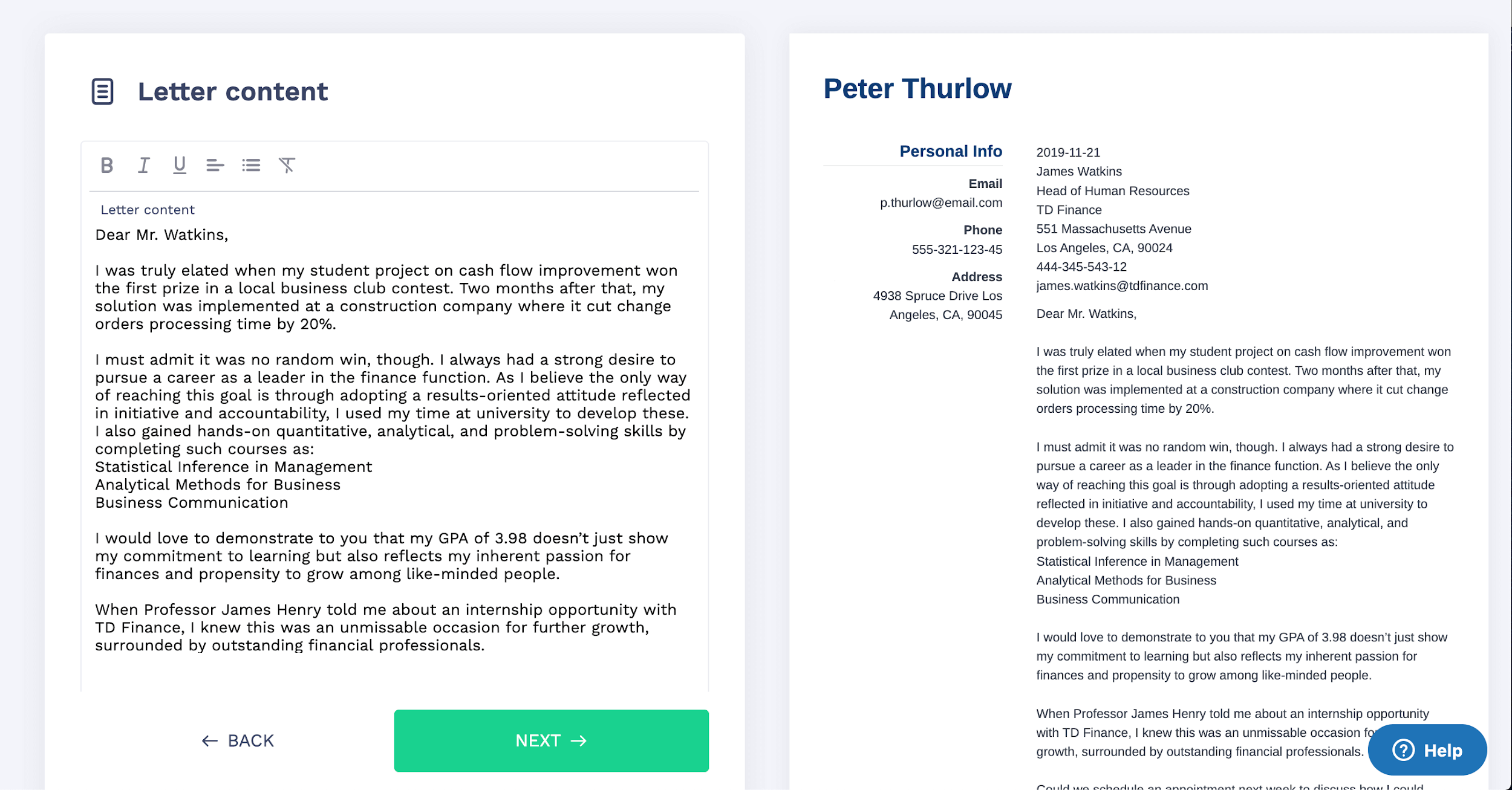
Want to try a different look? There's 21 more. A single click will give your document a total makeover. Pick a cover letter template here .
4. Add Achievements to Your Entry-Level Cover Letter
Any healthy relationship needs to be balanced, and a working relationship is no different. So, in this body section of your cover letter with no experience, you’ve got to show them both why you’re the ideal hire for them and how they are the company of your dreams.
This body could be one lengthy paragraph, but I’d suggest two paragraphs. Since you’re courting them , put their interests first:
Entry-Level Cover Letter Achievements—Sample
- I identified and implemented a change in cloud providers (to SWA, actually!), and this led to both an 15% increase in task completion speed as well as a 22% reduction in costs.
This cover letter sample shows them you know your stuff with numbers, quantifying it to prove what you’re saying is true. Plus it shows your enthusiasm, too.
Now, let them know why they’re your ideal workplace:
How about that example cover letter paragraph? It’s about you, yeah, but it’s still really about them. You compliment them fully, and they can feel that they’d be getting a dedicated team member were they to hire you.
Expert Hint : Use active voice on your first-time cover letter. Don’t say “the team was trained by me” (that’s passive voice). Instead, say “I trained the team.” It’s clear and concise.
5. End a Cover Letter for Entry-Level Jobs with a Call-To-Action
Like our beginning, the closing of a cover letter consists of three parts: a closing sentence or two, the complimentary close, and your signature.
Here’s an example cover letter closing statement:

Entry-Level Cover Letter Ending—Example
It’s a simple call-to-action which sums it all up nicely by insisting that you deserve that entry-level interview. Then, just the complimentary close: Sincerely,
And then your name, and done! “Regards” will also work, but if you want even more good cover letter alternatives, head on over to our guide on ending a cover letter properly.
Expert Hint : To really catch their attention, speak in the company’s “voice.” Check their website’s about page. For example, if they're upbeat and enthusiastic, use that style in your cover letter. Likewise, if they are formal and professional, be more reserved on your no-experience cover letter.
6. Win Them Over With a Postscript at the End of Your Entry-Level Cover Letter
Whether it’s a first cover letter or an executive cover letter with decades of experience, here’s one trick which works:
Add a postscript (that “P.S.”) after your signature. A postscript is meant to be used as an afterthought , but we’ll use this clever cover letter hack instead to show forethought .
Here’s an example of a cover letter postscript:
Cover Letter Postscript—Example
A postscript on an entry-level cover letter makes a great hack. It always draws the HR manager’s eyes, even if they hadn’t read the rest of your cover letter. Not only is this letter of interest sample postscript personalized to them, but they’ll be all but powerless not to go back to the beginning and give your cover letter a thorough read!
Expert Hint : How long should a cover letter be? Your cover letter should fill between half and three-quarters of a single page. Keep it three to four body paragraphs in length, which is about 200 - 300 words. Got more to say? Address it during the interview!
With ResumeLab’s resume builder you’ll write your resume in a flash. Get specific content to boost your chances of getting the job. Add job descriptions, bullet points, and skills. Improve your resume in our resume builder now .
CREATE YOUR RESUME NOW
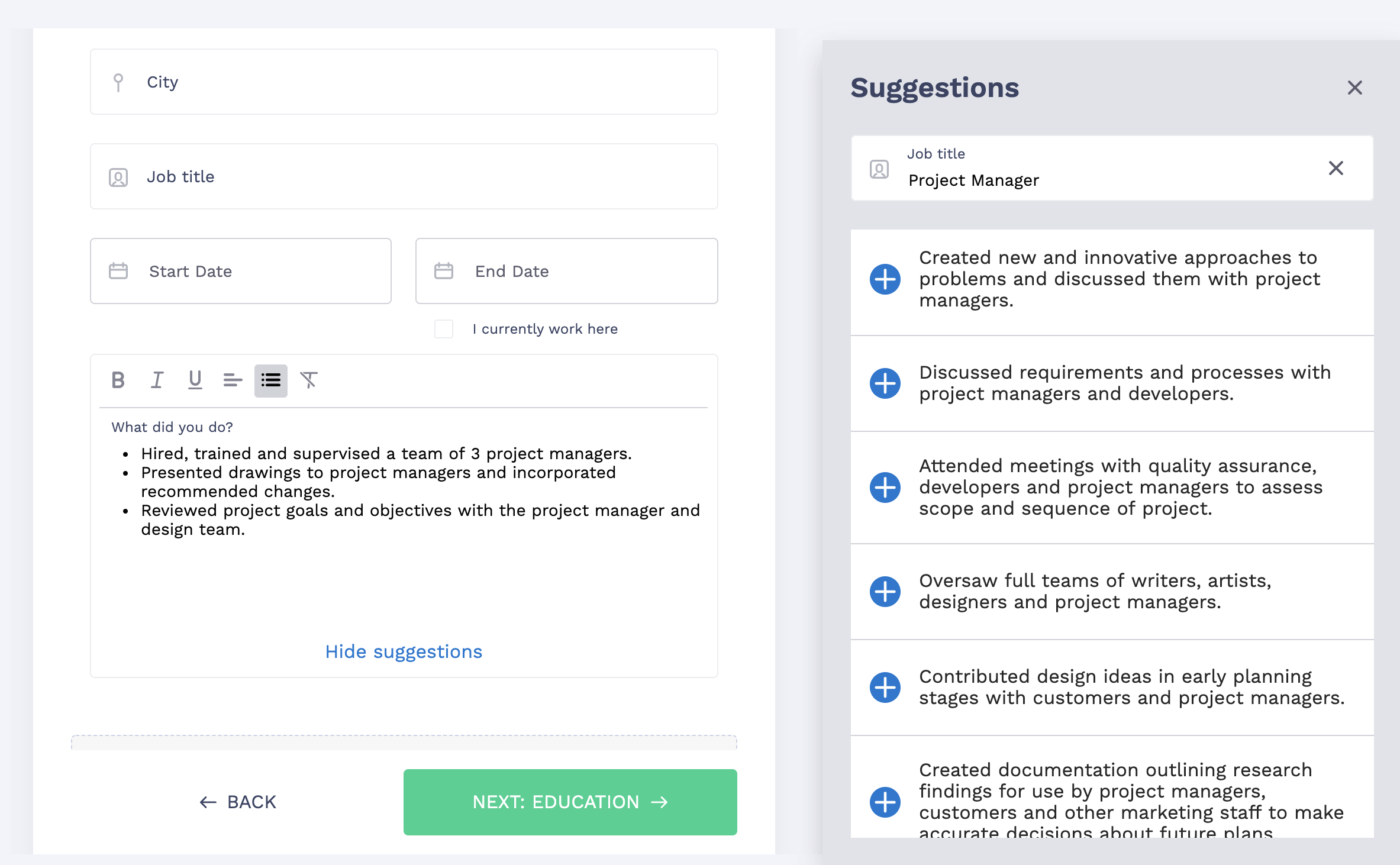
Nail it all with a splash of color, choose a clean font, highlight your skills in just a few clicks. You’re the perfect candidate and we’ll prove it. Just pick one of 21 resume templates and get started now .
To sum up how to write an entry-level cover letter for a job application, keep these key points in mind:
- Great cover letters add to your resume, so don’t repeat it verbatim.
- A cover letter is a formal letter, so follow a formal letter format (start with a professional header, your contact info, and proper salutation).
- You’ve got to grab their attention from the very start, so a compelling intro is a must (use your flashiest accomplishment).
- The body paragraphs should show enthusiasm and why you’re the perfect fit for the position (use numbers to show off with your achievements).
- A postscript after your signature is a clever hack to get one last word in at the end.
- Read our cover letter advice for more strategies on sending one that'll blow them away.
Have any questions on how to write a great entry-level cover letter? Let’s discuss it here below in the comments, and, as always, thanks for reading!
About ResumeLab’s Editorial Process
At ResumeLab, quality is at the crux of our values, supporting our commitment to delivering top-notch career resources. The editorial team of career experts carefully reviews every article in accordance with editorial guidelines , ensuring the high quality and reliability of our content. We actively conduct original research, shedding light on the job market's intricacies and earning recognition from numerous influential news outlets . Our dedication to delivering expert career advice attracts millions of readers to our blog each year.

Career expert who has been sharing his expert knowledge since 2017. His advice will guide you smoothly through all recruitment processes: from job hunting to getting a promotion. Christian offers comprehensive advice on career development and each step of the job search, from start to finish and beyond. His guides cover looking for new jobs, sending application documents such as resumes and cover letters, acing interview questions, and settling into the new position. Since 2017, he has written over 200 in-depth, meticulously-researched career advice articles in collaboration with the most renowned career experts in the world. Hundreds of thousands of readers visit Christian’s articles each month.

Was it interesting? Here are similar articles

Engineering Cover Letter Examples (+ Entry-Level) for 2025
If you want to outshine the other applicants, you need an engineering cover letter so hot, it’s off the Kelvin scale. This guide includes tips and examples you need to write it.

Christian Eilers
Career Expert
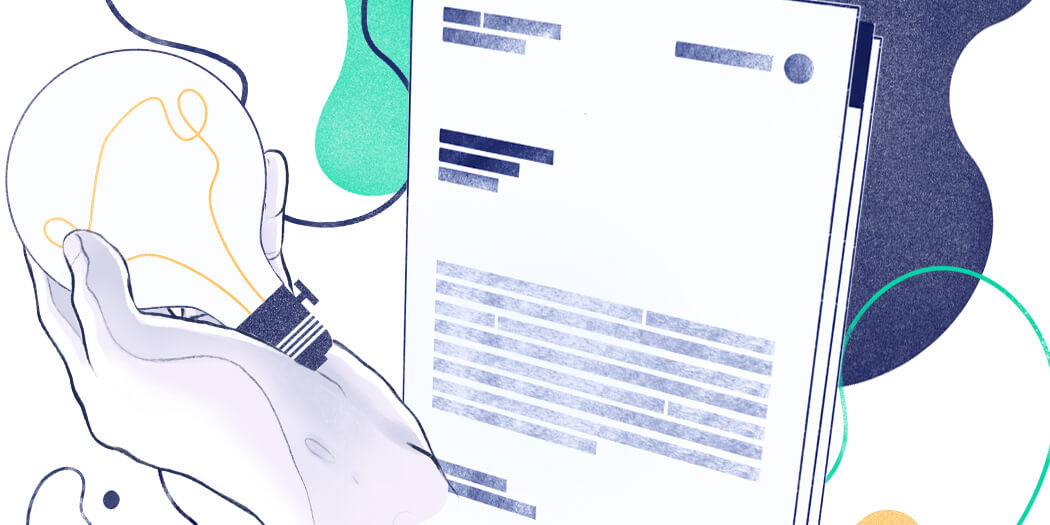
Email Cover Letter: 5 Samples & Writing Guide + Expert Tips
How do you write an email cover letter? Should you format it differently? Should you attach it? See 5 examples for different jobs to write a cover letter email that gets results.

Tom Gerencer
![cover letter for entry level position 35+ Cover Letter Templates to Try Right Now [Free & Premium]](https://cdn-images.resumelab.com/pages/free_templates_cover_letter_listing.jpg)
35+ Cover Letter Templates to Try Right Now [Free & Premium]
Looking for killer cover letter templates to take your job search to another level? Search no more. The best free cover letter templates are a few scrolls away from you.

Maciej Duszynski, CPRW
Certified Professional Resume Writer, Career Expert

The entry-level job cover letter that will get you noticed
A guide, with examples, to writing a cover letter for your first job.
Despite the minimal experience required, entry level positions can be quite competitive. You won’t be the only one applying. There’s a good chance that many students with similar experiences and educational backgrounds will apply to the same position(s) you’re considering. Additionally, the nature of the position predisposes the company to some risk. It’s as new of a venture for the company as it is for you.
Your cover letter needs to go beyond simply persuading the hiring manager. It needs to speak to their need of a candidate ready for a smooth transition. It needs to assuage any doubts they may have about you as an outside hire. A cover letter that hooks and satisfies the reader’s needs will go a long way in differentiating you as a prospect.
Format is crucial when writing a strong entry level job cover letter. It should be in business letter format , which means:
- All text is left justified
- The top should include your name, phone number, and email
- Then the date of application
- Then the information for the job you’re applying to
- Every body of text that follows should be separated by one line
- Your end closure and signature should be separated by four lines
Your intro format should look like:
Mark Étienne
(xxx) xxx-xxx
June 6, 2019
Marketing Assistant
Job ID: 5467382
NTN Marketing
Take the time to find out who the hiring manager for the role is. While listing the position as the recipient in this letter is sufficient, you’ll score bonus points for your diligence if you can cater the letter to that person. It’s worth the effort when you can include recipient information.
If there’s one portion of the cover letter that shouldn’t stand out, it’s the greeting. Keep it simple. Keep it professional. Dear Emily, is ideal. If the hiring manager has a doctorate (PhD or equivalent) address them respectively (i.e., “Dear Dr. Simmons,”). If you don’t have a name, you can use “ Dear Hiring Manager .”
You may have heard the common datum on attention span, that the average is no more than 8 seconds. You should assume the same for hiring managers sifting through hundreds of applications. If your opener isn’t compelling enough, your cover letter may end up in the wrong pile. Stick to a style that garners attention, such as:
My previous internship experience taught me that a marketing assistant is more involved than just analyzing and compiling customer data. Coffee and breakfast in hand, I spent my mornings compiling comprehensive competitive analyses based on our available data. My afternoons, looking for supplemental data to provide a stronger analysis. Every deliverable contained the necessary information to help the marketing team develop a better product for their clients. I took pride in my work, knowing that I was a part of the team that helped the company retain 80% of its clientele.
You’ll notice several elements in this paragraph that help keep the reader engaged, and also add value to the application.
- The narrative is written in a conversational, yet formal tone
- It contains some imagery and strategically paints a scenario
- There is data; something that reflects the writer’s involvement in their past internship’s success
Your next task is to garner interest from the reader. Give them an idea of your potential and what you may be capable of while working for them.
One year of internship experience at XYZ Branding has granted me the skills necessary to hit the ground running on day one. If given the opportunity, your company can benefit from the intern who previously:
- Provided written marketing ad materials boasting a minimum 11% conversion rate
- Helped design focus group environments that maximize accuracy and data reliability
- Helped conduct the in-depth market research in the industry
Data is everything. Be specific in any projects you worked in that led to any significant results. Use detailed percentages wherever possible. Also notice the lack of I statements . This is the easiest section to fall into an “I” trap. The more you say “you” and express how you can benefit the company, the less you have to try to convince them with the things “I” did.
Simply put, your hiring manager will want to know how you fit in their company. They want to know that you will be intrinsically motivated in doing your work , without needing significant direction. Research the company, really understand their needs, and take the following approach to instill desire in your talent:
As a passionate, results-driven individual, I am as dedicated as a company needs their best employee to be. I am aware that NTN Marketing is one of the leading marketing brands in the North East. And a company like yours can help create a mutually beneficial relationship with an employee who is ready for any undertaking.
If the job description goes out of its way to request hard-working, reliable candidates, then don’t sell yourself short. Let them know that you’ll be a great fit for the unique working environment they provide.
The call to action
Always end your cover letter with a strong call to action. Reminding the reader to reach out to you is crucial to ending up on the shortlist.
I would love to have the opportunity to further discuss my potential in working at NTN Marketing. Can we schedule a future date to discuss how I can help with your clients X Imaging, Y Tiling, and Z Construction?
The call to action is also a great space to namedrop on any specific information you may have researched about the company. Letting them know how you can benefit them in one of their existing projects, for example, shows that you are ready to start right away.
Gratitude is powerful and can go a long way. Thank the reader for taking the time to read the 100th cover letter for the day. They’ll remember that. It can be similar to:
I look forward to hearing from you. Thank you for your time and consideration.
Kind regards,
Mike Étienne
Full example:
See below for the cover letter example you can use when starting your own from scratch.
Dear Dr. Rojas,
Find the right jobs for you. Get hired.
Related stories, most recent stories.
Explore Jobs
- Jobs Near Me
- Remote Jobs
- Full Time Jobs
- Part Time Jobs
- Entry Level Jobs
- Work From Home Jobs
Find Specific Jobs
- $15 Per Hour Jobs
- $20 Per Hour Jobs
- Hiring Immediately Jobs
- High School Jobs
- H1b Visa Jobs
Explore Careers
- Business And Financial
- Architecture And Engineering
- Computer And Mathematical
Explore Professions
- What They Do
- Certifications
- Demographics
Best Companies
- Health Care
- Fortune 500
Explore Companies
- CEO And Executies
- Resume Builder
- Career Advice
- Explore Majors
- Questions And Answers
- Interview Questions
How To Write An Entry-Level Cover Letter (With Examples)
- Cover Letter Examples
- Best Cover Letters
- Cover Letter For Internship
- General Cover Letter Templates
- Career Change Cover Letter
- Promotion Cover Letter
- College Student Cover Letter
- Entry Level Cover Letter
- Legal Cover Letter
- Creative Cover Letter
- Cover Letter For Government Job
- Cover Letter With No Experience
- Short Cover Letter Examples
- How To Send An Email Cover Letter
- How To Write A Cover Letter For A Job With No Experience In That Field
Find a Job You Really Want In
If you’re an entry-level jobseeker, your cover letter is your best friend. Your cover letter is an opportunity to stand out as an entry-level candidate – because sadly, your resume probably won’t. Most people applying for the position will have fairly similar resumes, trying to make the best out of their limited experience . And like their similarly limited work experience and resumes, many of those other entry-level candidates make a lot of the same mistakes in their cover letters. But a cover letter that’s tailored to the specific position you’re looking for will open doors for you – even when your resume alone won’t. Key Takeaways: Entry-level cover letters should be between 250 and 300 words. Do not go over 400 words. Entry-level cover letters should be crafted for a specific position. Address what position you’re applying for, how you will fulfill the job’s responsibilities, and a bit of your personality. Specifically address your cover letter if you can and avoid generalizations in your opening. Make your cover easy to read and quantify your accomplishments. In This Article Skip to section What Is an Entry-Level Cover Letter? How to Structure an Entry-Level Cover Letter Elements of an Entry-level Cover Letter Common Mistakes in Entry-Level Cover Letters Entry-Level Cover Letter Tips Examples of Entry-Level Cover Letters Entry-Level Cover Letter FAQ Final Thoughts Sign Up For More Advice and Jobs Show More What Is an Entry-Level Cover Letter?
An entry-level cover letter is a document expressing your interest and qualifications for a job that qualifies as “entry-level.” Entry-level jobs typically don’t require much (if any) prior experience, so job-seekers can be at a loss for how to summarize their suitability for a job they have no background in.
Alongside your resume , your cover letter is the first impression a hiring manager or recruiter will have of you. Unlike a resume, a cover letter gives you a chance to explain why you’re interested in the role and how you’ll perform it.
The best cover letters will land you interview requests , so make sure you’re hitting your most impressive skills , experiences, and qualities.
Even without formal experience, everyone has a background that served to prepare them for success. The trick is understanding how your background fits into what the employer wants .
How to Structure an Entry-Level Cover Letter
The average amount of time hiring managers spend reading cover letters is six seconds. That means that they’ll spend as much time reading your cover letter as you spent reading this two-sentence introduction.
We’re even giving you the benefit of the doubt here on your reading speed.
You want to get their attention quickly and spend 250 words – but no more than 400 – showing the hiring manager:
What position you’re applying for
How you will fulfill the job’s responsibilities
A bit of your personality
Meanwhile the structure of a cover letter should be:
Contact information
Closing and signature

Elements of an Entry-level Cover Letter
Contact information.
There’s not too much to say here, except don’t get it wrong. You wouldn’t be the first person to accidentally leave old company information and dates on a reworked cover letter.
Your contact information goes near the top left margin. Put a space between theirs, space then the date, and then a space and the salutation. That’s how to address your cover letter :
City, state, zip code
Phone number
Break it up with a space, then:
A big caveat here is that if you’re sending an email cover letter, you put your personal contact info in the email signature. Also, remove the contact information for the person you’re contacting.
You should make your subject line informative and brief, something like “Bilingual Creative Writer seeks content creation position.” Or just use your name and the position title.
Salutations
Keep in mind that they’ll be skimming, so anything that screams “this is from a template” gets the boot pretty quickly.
No “Dear Sir or Madam:” and no “To Whom It May Concern:” – this just shows that you didn’t figure out who you’ll be addressing the letter to .
You may have forgotten, but “Mrs.” indicates marriage, so play it safe on the title – “Dear Mr./Ms. [Last Name]”
If you can’t figure out someone’s gender based off of their name, don’t guess. “Dear [Full Name]” is the safest road
You can use either a comma or colon – we prefer commas.
Do what you can to figure out who will be reading your letter. If it’s not in the posting, try searching the company website and LinkedIn . You might have success calling and asking the human resources department .
But if you’ve truly exhausted your search options, don’t fret. Some companies keep it on the down-low to keep people like you from spamming their inboxes with follow-up emails – “Dear Hiring Manager” or one of its variations will do.
The Opening Sentence(s)
Hiring managers read a lot of cover letters, and plenty of those are from people who don’t care much about landing that particular job.
So don’t open with “My name is [name] and I am applying for the [position] at [company] because [I need money].” You’ve given them your contact info and you’re applying for a job – they already know all of that. Start your cover letter off right.
Remember that you’re fighting to get noticed at this stage, so anything that they’ve already read from you – and other applications – makes their eyes glaze over.
Examples of Opening Sentence(s)
A solid opening statement can accomplish the three goals from earlier in one move:
Tell them what you want
How you’ll do it
Show them personality
Let’s look at some examples:
“I’ve wanted to work in broadcast journalism since a reporter interviewed me for winning my third grade spelling bee. The realization that I’m responsible for thousands of people’s “truths” resonated with me then, even if the truths were just how to spell prestidigitation.”
Why it works: So here the writer has announced that she wants a job as a broadcast reporter, she was an academic achiever (sort of), and that she has an appreciation for the solemnity of the profession. And it’s kinda cute.
Cute’s good; just don’t be too cute.
“My approach to management was drilled into me during my military training: be the kind of leader you want to follow.”
Why it works: This example identifies the job, obliquely mentions military experience , and also tells the reader that the writer knows what separates good bosses from bad ones.
“It didn’t land me on the cover of Forbes, but my college laundry delivery startup did teach me this: in sales, if you don’t measure it with reliable data, you can’t manage it reliably. Also, raise your prices before student loan checks arrive.”
Why it works: And here we know the writer is applying for a sales position, appreciates the value of metrics, is entrepreneurial, and has a sense of humor.
Be careful with the jokes though. You don’t have any idea what your hiring manager’s sense of humor is going to be like. If your joke doesn’t land, you’ll waste precious space and seem nonsensical – or worse, you’ll be deemed unfunny.
These examples have two important things in common: you don’t need experience to write them and they don’t explicitly state the job title.
Describing the job in the first sentence is a convention that can be done without — odds are that the reader will know what position you’re applying for, and if they don’t then you can more or less tell them in the introduction .
The Cover Letter Body
The biggest offense entry-level candidates make is handing over another version of your resume minus the bullets. Think of your resume as the “who-what-where-when” and the cover letter as the “how and why.”
The goal in the body of your cover letter isn’t just to tell them that you’re qualified; it’s to tell them that you’re the most qualified. And like the introductory statement, implication is a key element to the rest of the body. You’ll presumably have done research on the company and the job description – resist the urge to list them off in paragraph form.
The goal is to connect the dots for the reader without writing a sentence that sounds like this: “I’m a recent graduate of [your university] with [skill from posting #1], [skill from posting #2], and [skill from posting #3] skills.”
If the job posting describes someone who is a multi-tasker that meets deadlines, mention your time writing for your school paper while balancing a part-time job and schoolwork.
If they want someone who’s detail-oriented and a team player , bring up that fundraiser you organized for your fraternity. If they want someone who takes the initiative, tell them you unplug the thing and plug it back in before you call IT.
Volunteer experiences , internships , related classes , projects, leadership experience, extracurricular activities, and your skills that pertain to the position you’re applying for all can be mentioned in your cover letter. Just make sure to relate them to the job.
Don’t beg and don’t be overly effusive in your thanks. Even if it’s your dream job , you still want to make it seem like they’re offering you a business deal, not charity.
We’re fans of a standard closing :
I’d love to discuss the role with you further, and I appreciate the opportunity to tell you how my skills and ideas can benefit [company]. Thanks again for your consideration and I hope to hear from you soon. Many thanks, [Sign here if it’s a hard copy] [Name]
If it’s an email, just close with your email signature that includes contact information.
Common Mistakes in Entry-Level Cover Letters
And after all of that stuff that you should do, here’s a big list of things you shouldn’t do – because I hate to break it to you, but hiring managers normally have so many applicants that they look for reasons not to advance past cover letters.
Don’t send generic cover letters. You shouldn’t give employers an easy reason to move you into the reject pile. It’s not your fault that you don’t have much experience, but it is if you don’t look like you’re even trying.
Don’t forget about the reader. It might be your cover letter, but it’s their job to fill. Make it about how you’ll do the job well.
Don’t use too much jargon or difficult vocabulary. Give them something that they can read naturally and easily.
Don’t be too modest. This isn’t the time to sell yourself short .
Don’t go over 400 words. Ideally, your cover letter should be between 200-300 words. Just remember, keep it short , honest, and – of course – real.
Entry-Level Cover Letter Tips
Now that we’ve got the basic cover letter formatting down, let’s turn to some tips that apply to every entry-level cover letter:
Include universally-important skills. It’s good practice to incorporate skills from the job description into your cover letter. However, you should also take time to note your strongest transferable skills . These are mostly soft skills , like your interpersonal abilities, communication skills , and attention to detail.
You can also incorporate skills you’re learning or discuss areas where you have a baseline knowledge but wish to develop further.
Research the company. While you’re researching to find the hiring manager’s name, also look into the company. Identify their values, their way of doing things, their competition, and their primary short and long-term goals . Then, you can use that information to make your cover letter pop by showcasing what a great cultural fit you are.
Emphasize education. This one holds more true for recent college graduates than career-changers, but it’s important nonetheless. Without much formal, professional experience, you’ll need to rely on your educational excellence to carry your application.
You can mention relevant coursework, but it’s even better if you can discuss specific projects you worked on and had an impact on. Group projects, research, and any relevant extracurriculars are all fair game, as long as they tie into the job’s duties somehow.
Quanitfy accomplishments . This goes for school and any professional experience you have. If you don’t think you can quantify your achievements, try harder; think of things like frequency, scale, time, money, percentage changes, time saved, etc.
For example, instead of saying “answered phones,” say “responded to an average of 25 customer inquiries each day.”
Proofread. This is probably the most important tip for all of your professional correspondence. Use a spell-check tool, read your cover letter aloud, and have a trusted friend look it over for you. If you have the time, let your cover letter sit for a day so you can read it with fresh eyes.
A cover letter with even a single error tells recruiters and hiring managers that you don’t care very much about this job prospect.
Examples of Entry-Level Cover Letters
John Brown 123 Brook Ln. Towne, MD 123-456-7890 [email protected] 08/24/2020 Ashley Smith Senior Analyst 456 Technology Way Landon, MD Dear Ms. Smith, As a senior sports management student at Roothers State College, I was excited to see your posting for equipment interns. Within my degree program, I have been able to gain experience working with athletes across football, basketball, and baseball. I have been one of only four students to successfully complete rotations in all three sports in four semesters. I have maintained a 3.8 cumulative G.P.A throughout my academic career, while also being active in several campus recreational leagues. I have found that participating in sports gives operations staff a unique perspective when it comes to working with athletes. This has also helped me to interact with diverse groups of people and maintain a working knowledge of each sport. I know how to organize, coordinate, and assist with all aspects of equipment management due to my experience. It has been a dream to work for a professional sports team, but the Maryland Tigers is a franchise that I truly believe in. I have watched as the organization supports young players and always gives back to the local community. Being that I have also volunteered with little league teams, I know that the core values of the organization align with my own. I am confident that I would make an ideal candidate for the equipment intern role. Whether assisting coaches with drills or maintaining inventory, I can be an asset to the team. I look forward to learning more about the internship and discussing my qualifications in detail. I have provided my contact details for your convenience. Best regards, John Brown
Subject Line: Amy Grant – Junior Copywriter Dear Mr. Jones, At a recent Job Fair, I had a great conversation with ABC’s recruiter Doris Kelly about the Junior Copywriter positions opening up. As a graduating student of English, I was ecstatic to learn more about the content marketing strategy ABC is currently implementing. As an English student at UVM, I have strong written communication skills that I have developed through writing 10 undergraduate research papers for the Honor’s program, including my 20,000-word undergraduate thesis that won an award for excellence. I’ve also worked as a team to develop marketing for three different English-department-sponsored fundraising drives. Additionally, I’ve mentored fellow students by working at UVM’s writing center since my sophomore year. Since the Junior Copywriter position involves working together with the product, design, and marketing teams, my background working with people from different backgrounds would be an asset. I also know the importance of deadlines, and never missed an assignment deadline in my undergraduate experience. I’m proficient with Microsoft Office and Google Suites and have a working knowledge of WordPress developed from working on my personal blog and UVM’s writing center website. I appreciate you considering me for the role of Junior Copywriter at ABC, and I look forward to speaking more with you about the position. Sincerely, Beverly Brown [email protected] 555-654-3210 www.bevbrownwrites.com
Entry-Level Cover Letter FAQ
Do entry-level jobs require cover letters?
Yes, entry-level jobs require cover letters. Crafting a cover letter for an entry-level job is especially important because it can help you stand out to your potential employers and help you land your first job after school.
What do you write in a cover letter if you have no experience?
When writing a cover letter with no experience, be sure to highlight the soft skills you may have acquired through hobbies, educational courses, or volunteer work. Soft skills are especially important to discuss in your cover letter with no experience because they can be difficult to teach.
These skills are typically naturally developed throughout your life, whereas hard skills can be taught on the job. Additionally, it’s a good idea to include how passionate you may be to learn new skills for the job you’re applying for.
Do employers read cover letters?
Yes, employers read cover letters. This is especially true when a cover letter is specifically required for your application.
A recent Career Builder study suggests that almost half of HR managers consider a cover letter the second best thing to give your resume a boost during the candidate selection process.
How do you start an entry-level cover letter?
Start an entry-level cover letter by enthusiastically describing why you’re interested in the role. The first paragraph of your cover letter is your opportunity to make a strong impression on the hiring manager.
Final Thoughts
Writing a cover letter without much experience can be difficult. Just remember that everyone has skills, passions, and success stories. The important part is distilling those things down into a half-page document that paints you as the ideal candidate for a job.
Follow these cover letter tips, and you’ll have hiring managers and recruiters calling you for interviews in no time.
How useful was this post?
Click on a star to rate it!
Average rating / 5. Vote count:
No votes so far! Be the first to rate this post.

David Luther was the Content Marketing Editor for the Zippia Advice blog. He developed partnerships with external reporting agencies in addition to generating original research and reporting for the Zippia Career Advice blog. David obtained his BA from UNC Chapel Hill.
Matt Warzel a President of a resume writing firm (MJW Careers, LLC) with 15+ years of recruitment, outplacement, career coaching and resume writing experience. Matt is also a Certified Professional Resume Writer (CPRW) and Certified Internet Recruiter (CIR) with a Bachelor of Science in Business Administration (Marketing Focus) from John Carroll University.

Related posts
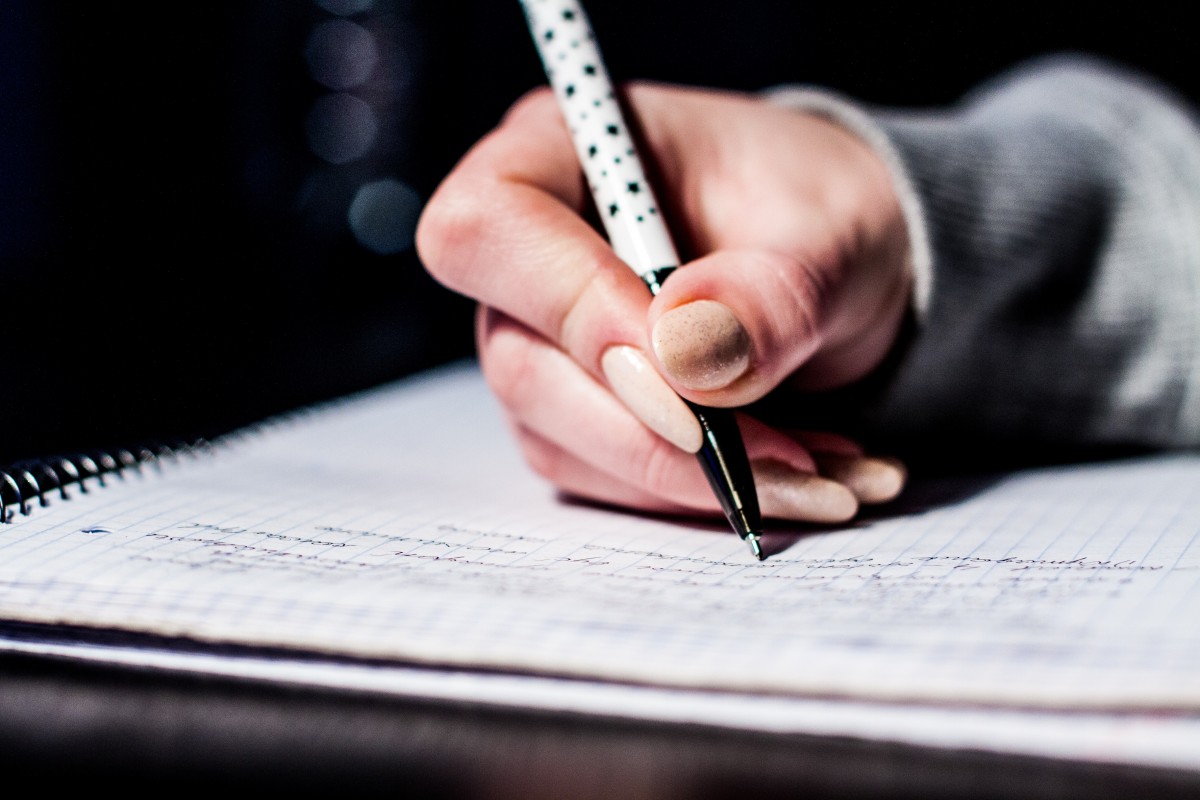
How To Write A Cover Letter Body (With Examples)
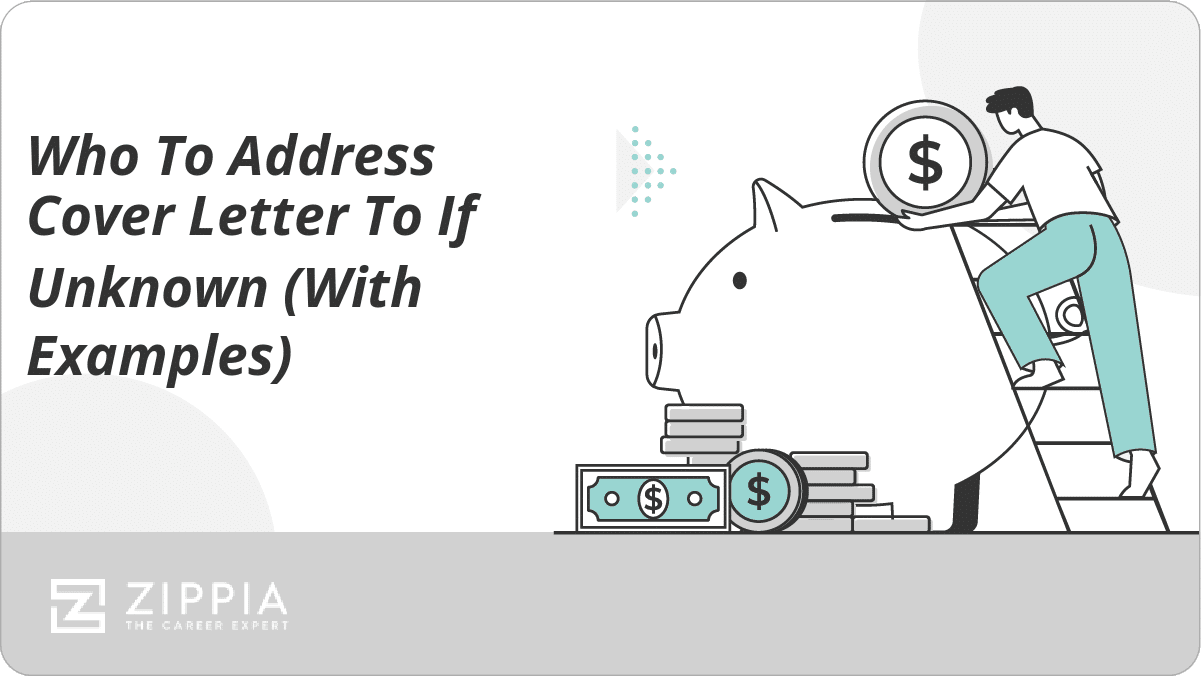
10 Best Ways To Address A Cover Letter Without A Name
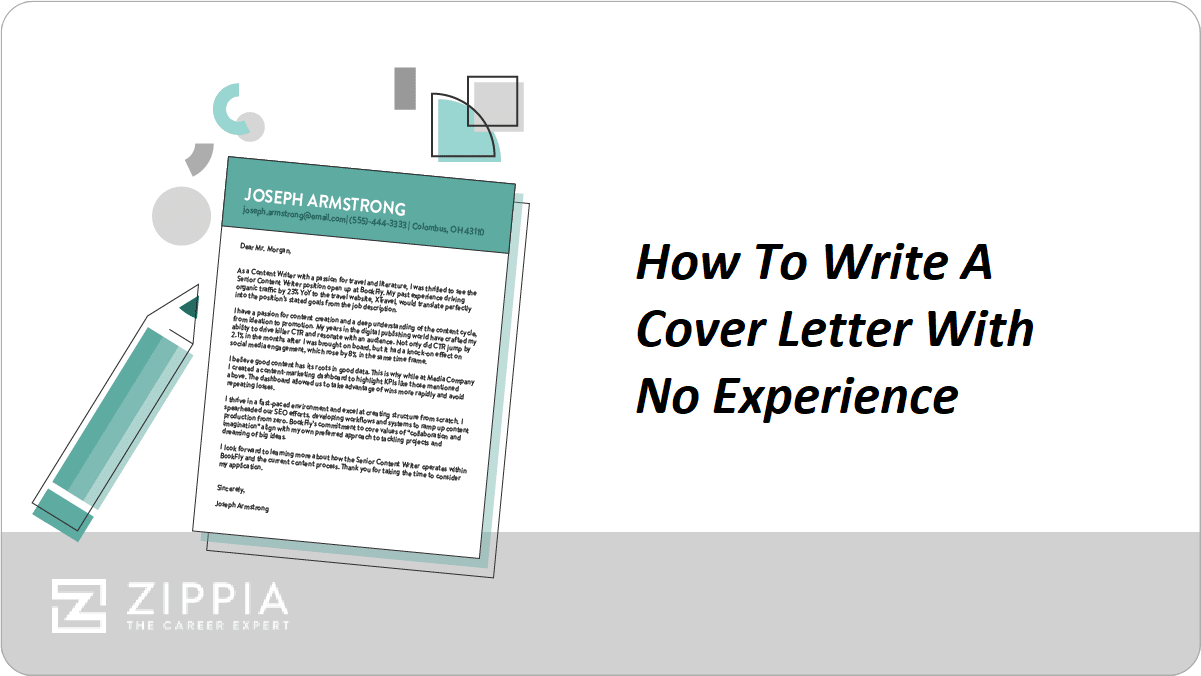
How To Write A Cover Letter With No Experience

How To Start A Cover Letter (With 30 Examples)
- Career Advice >
- Cover Letter >
- How To Write An Entry Level Cover Letter

IMAGES
COMMENTS
Aug 15, 2024 · An entry-level cover letter is a document to add to your work portfolio that identifies your knowledge and skills and how they make you the best candidate for a job. You should use an entry-level cover letter along with your resume during a job search to make an impactful first impression.
Aug 26, 2024 · Need to write a cover letter for a job you have no experience in? Our in-depth guide will help you write a convincing entry-level cover letter.
6 days ago · Your entry-level cover letter should follow the following format: header, addressing the recruiter/company, opening paragraph, body, closing paragraph, formal salutation. To write a good entry-level cover letter you should write an attention-grabbing opening, include some relevant skills, highlight your education, and make a call to action.
Oct 21, 2024 · An entry-level cover letter has to be tailored to the specific entry-level position you are applying for. It should concisely describe your relevant experience , skills, education on a resume , and experience that make you the best fit for the job.
As you apply for entry-level jobs, remember that they require cover letters. This letter will help to highlight your potential and present attributes and qualities that make you a qualified candidate.
4 days ago · Write an entry-level cover letter that gets interviews. Use our writing guide and examples made by career experts to make a standout cover letter.
Nov 4, 2024 · An entry level cover letter is a document you can include along with your resume and application when applying for your first job. The purpose of this letter is to showcase your skills, knowledge, and make a good impression on the hiring manager even if you have no experience.
Jun 6, 2019 · A guide, with examples, to writing a cover letter for your first job. Despite the minimal experience required, entry level positions can be quite competitive. You won’t be the only one applying.
Here are 4 steps to writing a cover letter for a job when you have little or no experience: 1. First Paragraph: Clearly introduce yourself. The first paragraph is your opportunity to make a strong first impression on the employer. This section should explain.
Jul 21, 2022 · Entry-level cover letters should be crafted for a specific position. Address what position you’re applying for, how you will fulfill the job’s responsibilities, and a bit of your personality. Specifically address your cover letter if you can and avoid generalizations in your opening. Make your cover easy to read and quantify your accomplishments.